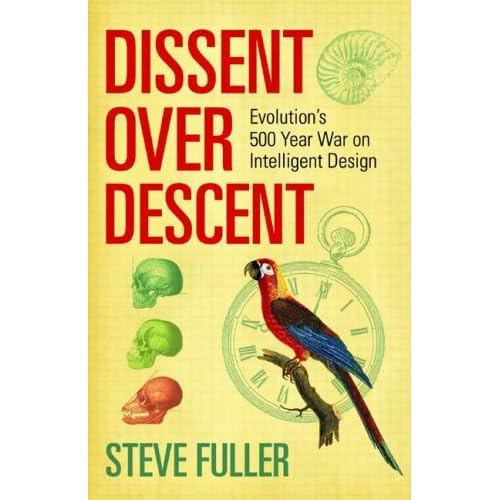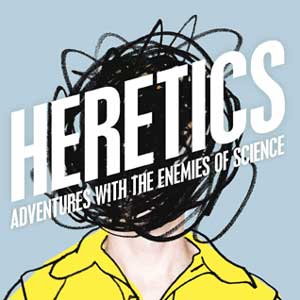
Read Steve Fuller's response to this review. You can also read a further response from AC Grayling
It is sometimes hard to know whether books that strike one as silly and irresponsible, like Dissent over Descent, the latest book from Steve Fuller, are the product of a desire to strike a pose and appear outrageous (the John Gray syndrome), or really do represent that cancer of the contemporary intellect, post-modernism. I suppose putatively sincere extrusions of the post-modern sensibility might henceforth deserve to be known as “the Steve Fuller syndrome”. For this offering by the American-born sociologist is a classic case of the absurdity to which that sensibility leads.
There is an added thought. Fuller claims to be a “secular humanist”. But having been educated by the Jesuits, so he tellingingly informs us, he “knows how to reconcile the irreconcilable”. Indeed! For at the end of these nearly 300 pages of wasted forest he tells us what science needs in order to justify its continuation (oh dear, poor science, eh?) and what Intelligent Design, a theory he defended before a US Federal Court in the 2005 Dover Trial, needs to “realise its full potential in the public debate” – that is: how a theory trying to bend the facts to prove its antecedent conviction that Fred (or any arbitrary and itself unexplained conscious agency) designed and created the world and all in it, can attain its full potential in the public debate. This, note, from a professor at a proper British university. Well: if this is not proof of the efficacy of Jesuit educational methods, nothing is.
I shall not bore you, or waste my own time, with detailed rebuttals of the argument in the chapters “Is there a middle ground between creation and evolution?” and “Is Intelligent Design any less scientific than evolution?”, because once one has tackled the premises on which this farrago proceeds, that effort is rendered unnecessary. As follows.
Fuller describes Intelligent Design (ID) theory as the project of establishing “by the usual scientific appeals to reason and evidence” that the world and life in it were purposefully designed by an intelligent agency competent to the task of creating a universe. Call this Point 1.
Fuller claims that ID is “behind the scientific revolution that has been under way in the West since the 17th century” because the motivating belief behind scientific enquiry is that “nature is so constructed” that it can be understood because – as St Augustine taught us – man is made in the image of God and is therefore capable of understanding the universe. Call this Point 2.
Fuller claims that there is no such thing as a “scientific consensus” anyway, and that it is false that evolutionary theory is the cumulative result of progress in scientific enquiry. Call this Point 3.
Fuller claims that science results from religion, that “no plausible alternative has yet been offered to justify the pursuit of science as a search for the ultimate systematic understanding of reality” other than belief in a divine personal creator, and that “atheism has done precious little for science.” Call this Point 4.
Ah well: Wellington boots on, and into this swamp of BS we go. On Point 1: no, ID theory is not a project that proceeds on “the usual scientific appeals to reason and evidence.” It starts from a fixed conclusion, and looks for evidence to support it. Does it specify what would refute the fixed belief in a designing intelligence that is its starting point? Does it tell us what would count as a test of what it has already accepted in advance, before the search for allegedly supportive evidence begins? It does not. Science, by contrast, hypothesises, tests, and gives up hypotheses when the evidence shows them to be incorrect. There is a whole universe of difference between true science and the effort of ID theorists and creationists to find useful propaganda among the facts and alleged facts to support its prior convictions.
Fuller has written about Popper; he seems to forget Popper’s killer point, namely, a theory that explains everything explains nothing. ID is such a theory; everything is consistent with it, nothing disproves it. The idea that there is such a thing as a deity behaves logically as a contradiction does (unsurprisingly, because the idea is indeed contradictory): anything whatever follows from it. (But presumably this is okay for Fuller because he was educated by Jesuits.)
On Point 2: from a thousand years before St Augustine, Thales and the Pre-Socratics and Plato and Aristotle and the Stoics and Epicureans were thinking in recognisably scientific and proto-scientific ways about the nature and functioning of the universe, on the assumption that human intelligence is competent to understand the workings of nature, which observation abundantly suggests are regular and ordered – it needs no gods to point out how spring returns after every winter, and the crops grow again as they did before, and so manifestly on. Not only did people emphatically not have to wait for St Augustine to discover that they could enquire thus, without invoking supernaturalistic beliefs of any sort, but it is indeed a mark of the thought of Thales and his successors that they did not start from such beliefs, but began their thinking from observation and reason. It was the revival of their independence of thought in the Renaissance and afterwards – the rediscovery of a non-theistic tradition of thought about the world – that represented a resumption of the scientific enterprise that had been crushed by religious dogma for a millennium, and which in the 16th and 17th centuries had a struggle to free itself from religion’s iron opposition – witness the church’s denial of Copernican heliocentrism and the trial of Galileo for two related instances. And the religious are still at it today – the ID theorists are the inheritors of Cardinal Bellarmine in refusing to accept what science discovers, as is the Vatican in its opposition to stem cell research. Examples are legion. About the only thing that can explain Fuller’s effort to re-run the tired argument that modern science is the kindly gift of 16th-century religion (of the Inquisition, perhaps, in the intervals between killing people who did not believe that e.g. the sun stood still over Jericho?) is ignorance.
Now as to Point 3, about the alleged absence of a “scientific consensus” and the “mistake” of thinking that evolutionary theory is a success story of cumulative enquiry. The latter we can pass over briefly. Let us allow the cumulative confirmation of evolutionary theory to speak for itself, thus leaving Lyell’s geology, Darwin’s observations of the finches of the Galapagos, Mendel’s peas, the combination of genetic theory and understanding of selection both natural and artificial, the fossil record, comparative anatomy and physiology, and a mass of observation, experiment and discovery, to one side (nothing cumulative and progressive about this, eh?), and just remark that Fuller – as with everything else he tries to discuss in this book – must really do a lot more homework.
The “consensus” point requires a bit more attention. Fuller’s claim here is the open-a-gap technique; if scientists disagree about something, if there is no consensus among them, perhaps you can slip an alternative – a god or two? a bit of putative intelligent design? – into the gap. But Fuller really is in a muddle here. He says there is no scientific consensus (in general? or only on a case-by-case basis in regard to some cutting-edge, currently researched problem?) but nevertheless that there is a “scientific orthodoxy” which, if you do not sign up to it, excludes you from access to its structures – presumably, to jobs and funding in science. Well: scientists tend to be clever people so I suppose they are capable of managing to have an orthodoxy without a consensus, though to me that sounds like a contradiction. But let’s accept it momentarily. Is the universal agreement among scientists about the periodic table, the predictive power of quantum theory, the methods of testing efficacy of pharmaceutical compounds, and so on for a million such things, a mark of “orthodoxy” but not a fundamental “consensus” about basics, methods and the like? Or might it just be the case that the foundations of science are very secure, universally accepted, and the basis on which open questions, research and debate proceed, and in the light of which they make sense? No doubt ID types like to characterise the existence of as yet unsolved problems and the way research opens new questions for examination as “evidence” that science is in some sort of disarray and in need of appeal to deities to sort it out (scientists debate, they research, they sometimes disagree – so there must be a god!). But here is where Fuller is again in danger of going down his own plughole. If science is impugnable in the way that Fuller alleges, then his describing “ID science” as proper science – without consensus! with a constraining orthodoxy! – is likewise impugnable. Can he have it both ways? Well: he was educated by the Jesuits, remember.
As to point 4: let us not forget that for a person to acknowledge that he or she was non-religious at any point before the 19th century in Europe or the Americas was at least to invite social exclusion, at worst to invite death. So everyone “was religious”. The education, such as it was, for most people was religious education; children learned to read by reciting by rote from the Bible as the children in Pakistan’s madrassas today learn the Koran’s suras by rote. Even we atheists say things like “for god’s sake!” and “oh hell!”. So when any historically derived idea not actually part of the dogma or scriptures of some religion is described as a “religious” idea it might as informatively be described as a “human idea” or “a social idea”. In a chapter subtitle Fuller writes “Consensus: The Extension of a Religious Idea to Science”. You see the technique: how easy it is to ascribe everything to a source in religion, because religion was historically the social element as water is the element in which fish live. Attributing anything other than specific doctrine to “religion” is therefore vacuous.
This, though, is another mark of ignorance and historical short-sightedness on Fuller’s part. As the dominant religion of Europe and the world it conquered, Christianity imported massive dollops of Greek philosophy to supply the deficiencies in its ethics and metaphysics, starting with the importation of Neoplatonism some centuries after the lifetime of Jesus, when it was clear that the End of the World had been postponed, and reaching high tide in the late medieval period with the patching of Aristotle into theology effected by Aquinas and some of the Schoolmen. Many of the ideas that are often attributed to a religious source in the modern period are therefore secular, non-theistic borrowings from the Greeks, bluetacked on to the incoherencies of faith, and rescued from that affiliation by the resumption of rational enquiry in the scientific revolution.
And what has atheism done for science? Well, let’s see: it removed the risk of scientists being burned at the stake for controverting the divinely revealed truth that “the lord hath laid the foundations of the earth so that it shall not be moved for ever” (Psalm 104, beloved of Bellarmine in his efforts to shut up the astronomers and philosophers of the era of Descartes). It removed the necessity of having to distort observations, facts, experimental results and observations to fit an antecedent doctrine as far from what observation and experiment revealed as one could possibly get. (Think about seeing the moons of Jupiter through a telescope in an age when the earth was – by order! – at the centre of the universe and man and his man-made religion was the most important thing in it, with the Pope and the Office of the Inquisition daring you to think otherwise.) In short, it liberated the mind and enquiries of mankind. Decreasing religious hegemony and rapidly increasing scientific and technological knowledge have gone pari passu during the last four centuries, in mutually reinforcing tandem: the less religion, the more science; the more science, the less religion. And this is a universal phenomenon (see the Pew polls on the decline of religion, even in the USA).
Here I have commented only on some of the premises of Fuller’s book. The demerits of ID theory itself – so woeful as to be funny: in this world of ours, with so much failed experiment of life, so much repetition and haphazard variety of endeavour to meet the challenge of passing on genes, to claim the existence and activity of a supernatural designer would be a sort of blasphemy on the latter, if it existed – are well enough known not to require the wasted effort of iteration; nor does the overwhelming security of evolutionary theory in biology require defence. In the interests of our forests, therefore, I stop here, save to bemoan the fact that Fuller has produced not merely an irresponsible but a bad book, whose one saving grace is that, by default, it drives another nail in the ID coffin.
[An earlier version of this article misidentified Psalm 104 as Psalm 102. This has been corrected]
Read Steve Fuller's response to Grayling's review, followed by Grayling's response to Fuller.
 Dissent Over Descent: Intelligent Design's Challenge to Darwinism by Steve Fuller was published in June by Icon Books, UK £ 12.99 , Canada $26.00
Dissent Over Descent: Intelligent Design's Challenge to Darwinism by Steve Fuller was published in June by Icon Books, UK £ 12.99 , Canada $26.00
ISBN 978-184046804-5

